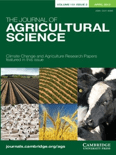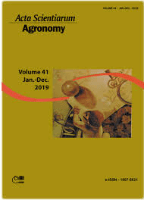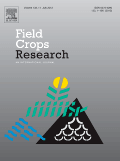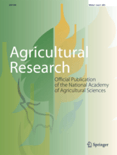
JOURNAL OF AGRICULTURAL SCIENCE
Scope & Guideline
Cultivating Knowledge for a Sustainable Future
Introduction
Aims and Scopes
- Crop and Livestock Integration:
Research focusing on the integration of crop and livestock systems, aiming to optimize resource use and enhance productivity through practices such as crop rotation, intercropping, and agroforestry. - Genetic and Breeding Studies:
Studies on genetic parameters, breeding strategies, and genomic evaluations for improving traits in livestock and crops, focusing on growth, yield, and resistance to diseases. - Nutritional Management and Feed Efficiency:
Research on feed formulations, nutritional management strategies, and their impact on animal performance, health, and product quality, including studies on sustainable feeding practices. - Soil and Crop Management:
Investigations into soil fertility, tillage practices, and sustainable agriculture techniques aimed at improving soil health and crop yield. - Environmental Impact and Sustainability:
Research addressing the environmental impacts of agricultural practices, including studies on greenhouse gas emissions, carbon sequestration, and sustainable resource management. - Innovative Agricultural Technologies:
Exploration of advanced agricultural technologies, including precision agriculture, biotechnologies, and machine learning applications to enhance productivity and efficiency.
Trending and Emerging
- Climate Resilience and Adaptation Strategies:
Research focusing on how agricultural systems can adapt to climate change, including studies on drought resistance, water management, and crop resilience. - Sustainable Agricultural Practices:
An increasing emphasis on sustainable practices, including regenerative agriculture, conservation tillage, and agroecological approaches that enhance soil health and biodiversity. - Innovative Feeding Strategies for Livestock:
Growing interest in alternative feed sources and nutritional strategies that improve feed efficiency and animal health while reducing environmental impact. - Precision Agriculture Technologies:
Emerging research on the use of digital technologies, data analytics, and automation in agriculture to optimize resource use and improve productivity. - Agroecological Systems and Biodiversity:
A rising focus on agroecological systems that promote biodiversity, soil health, and ecosystem services as integral components of agricultural production.
Declining or Waning
- Traditional Crop Breeding Techniques:
Research focusing on traditional breeding methods has decreased in favor of genetic engineering and genomic approaches, reflecting a broader shift toward biotechnological innovations. - Single-Crop Systems:
The emphasis on monoculture practices is waning as more researchers advocate for diversified cropping systems that promote resilience and sustainability. - Chemical Fertilizer Dependence:
Studies solely focused on chemical fertilizers are declining as there is an increasing interest in organic farming practices and integrated nutrient management strategies. - Pesticide Application Practices:
Research on conventional pesticide application methods is decreasing as the focus shifts toward integrated pest management and organic alternatives. - Livestock Production in Isolation:
Research on livestock production systems that do not integrate crop-livestock synergies is becoming less common as the benefits of integrated systems gain attention.
Similar Journals

Revista de Agricultura Neotropical
Unlocking the Potential of Tropical Crop ManagementRevista de Agricultura Neotropical, published by UNIV ESTADUAL MATO GROSSO SUL, serves as a pivotal platform for disseminating research in the fields of agronomy and crop science. Since its inception as an open-access journal in 2014, it has been dedicated to promoting innovative research and practical applications within the agricultural sector, specifically tailored to the challenges and dynamics of the tropical agriculture landscape in Brazil and beyond. Although currently positioned in the Q4 quartile of Scopus rankings, and with a modest agricultural science percentile, the journal actively encourages contributions that highlight sustainable agricultural practices, tropical crop management, and emerging technologies in farming. With its commitment to open access, the Revista de Agricultura Neotropical broadens the reach of critical knowledge, making it accessible to researchers, professionals, and students alike, thus fostering a collaborative environment for advancing agri-scientific initiatives.

CROP SCIENCE
Fostering breakthroughs in crop production and genetics.CROP SCIENCE, published by WILEY, is a premier journal dedicated to the field of agronomy and crop science, offering a platform for high-quality research on crop production, genetics, and sustainable agricultural practices. With an impactful presence since its inception in 1974, the journal has become a significant contributor to advancing knowledge in this critical field, as evidenced by its Q2 ranking in the 2023 categorizations and a Scopus rank in the 72nd percentile among its peers. The journal's aim is to disseminate innovative research findings that inform best practices and policies for enhancing crop yield and sustainability, making it an essential resource for researchers, professionals, and students alike. Although CROP SCIENCE does not currently offer open access options, the journal’s extensive readership and reputation make it a valuable asset for anyone invested in the future of agriculture.

ACTA SCIENTIARUM-AGRONOMY
Driving excellence in agronomy for a thriving planet.ACTA SCIENTIARUM-AGRONOMY is a prestigious, peer-reviewed journal published by UNIV ESTADUAL MARINGA, PRO-REITORIA PESQUISA POS-GRADUACAO, focusing on advanced research in the field of agronomy and crop science. Since its inception as an Open Access journal in 2007, it has significantly contributed to disseminating high-quality research, allowing unrestricted access to its content for a global audience. Operating from Brazil, the journal holds a notable Q2 category ranking in Agronomy and Crop Science as of 2023, validating its importance within the academic community. The journal’s Scopus ranking positions it in the 49th percentile among Agricultural and Biological Sciences, indicating a robust foundation for impactful research. With a commitment to innovation and scientific excellence, ACTA SCIENTIARUM-AGRONOMY aims to provide researchers, professionals, and students with vital insights that drive forward our understanding of agriculture and its environmental implications.

FIELD CROPS RESEARCH
Unlocking the Potential of Crop Production ResearchFIELD CROPS RESEARCH is a premier academic journal published by Elsevier, dedicated to advancing knowledge in the fields of Agronomy and Crop Science as well as Soil Science. Now in its 46th year of publication, this esteemed journal has established itself as a leading resource, holding a prestigious Q1 ranking in both the Agronomy and Soil Science categories, with a remarkable blend of rigorous peer-reviewed research and innovative findings. With a Scopus ranking of #27/406 in Agronomy and #20/159 in Soil Science, and a notable 93rd and 87th percentile respectively, FIELD CROPS RESEARCH plays a vital role in informing practices that drive sustainable agriculture and optimize crop production. Although not an open access journal, it remains highly accessible to the global research community and offers critical insights that influence policy and agricultural practices worldwide. Researchers, professionals, and students are encouraged to delve into this journal, as it continues to shape the future of field crop research through impactful studies and comprehensive reviews.

Revista Ciencia Agronomica
Transforming research into real-world agricultural solutions.Revista Ciencia Agronomica is a leading open access journal published by the Universidade Federal do Ceará, Departamento de Geociências, dedicated to advancing the field of agricultural sciences. Established in 2008, the journal has emerged as a significant platform for the dissemination of original research and innovative advancements in areas including agronomy, horticulture, and soil science, with a dedicated convergence of years extending to 2025. With an impactful presence in academic circles—ranking in Q3 for Agronomy and Crop Science and Soil Science and Q2 for Horticulture in 2023—this journal provides vital insights for researchers and practitioners alike. Although specific HIndex metrics are currently unavailable, the journal's Scopus rankings attest to its relevance, placing it in the 52nd, 44th, and 43rd percentiles across multiple pertinent categories. Since transitioning to an open access model in 2010, Revista Ciencia Agronomica has committed to maximizing the reach and impact of its published work, thereby ensuring valuable contributions to global agricultural knowledge.

Advances in Agriculture
Transforming Agriculture with Open Access InsightsAdvances in Agriculture is a prominent Open Access journal dedicated to the dissemination of high-quality research in the fields of agriculture, agronomy, animal science, food science, and soil science. Published by HINDAWI LTD from the United Kingdom, this journal has made significant strides since its inception in 2014, contributing to the advancement of agricultural knowledge and practices. With an impressive impact factor reflected in its tiered quartile rankings, notably Q2 in Agricultural and Biological Sciences (miscellaneous), Agronomy and Crop Science, and Animal Science and Zoology, it serves as a key platform for innovative research and applied science. The journal aims to provide researchers, professionals, and students with rich access to groundbreaking studies that can help shape sustainable agricultural practices and policies. Emphasizing a global audience, Advances in Agriculture promotes an inclusive dialogue among scholars to tackle contemporary challenges in agriculture, enhancing food security and environmental stewardship worldwide.

AGROCIENCIA
Elevating research to meet the challenges of agriculture.AGROCIENCIA, published by COLEGIO POSTGRADUADOS, is a key journal in the fields of agronomy, animal science, and environmental science in Mexico. With an ISSN of 1405-3195 and an E-ISSN of 2521-9766, this journal has been a crucial platform for disseminating research findings since its inception in 2000. Operating from Montecillo, Estado Mexico, it provides an outlet for scholars and practitioners to share innovations and insights that directly impact agricultural practices and environmental sustainability. Despite its current categorization in the Q4 quartile across multiple disciplines, AGROCIENCIA strives to elevate the quality and reach of research, fostering a collaborative approach to tackle pressing issues within the agricultural sciences. Access options are primarily through institutional subscriptions, allowing for a diverse audience of researchers, professionals, and students to engage with the latest studies aimed at advancing knowledge in the agricultural sector. As the journal converges towards its 2024 milestone, it remains dedicated to enhancing scientific inquiry and promoting effective solutions within its discipline.

TROPICAL AGRICULTURE
Nurturing the growth of agronomic research in the tropics.Tropical Agriculture is a reputable journal dedicated to advancing knowledge and research in the fields of Agronomy and Development, with a particular emphasis on tropical farming practices and agricultural innovation. Published by the University of the West Indies, this journal serves as a crucial resource for researchers, professionals, and students engaged in the complexities of agriculture in the tropics. Established in 1979, it has witnessed significant contributions and continues to facilitate scholarly discussions through its quarterly publications. While the journal currently holds a Q4 ranking in both the Agronomy and Development categories, its commitment to fostering research excellence positions it as a pivotal platform for emerging studies and regional agricultural advancements. Although not an open-access publication, it provides critical insights and localized research that greatly benefit the agricultural community, particularly within the Caribbean context. Researchers and professionals in the field can rely on this journal for insightful content on tropical agricultural challenges and developments, enhancing knowledge dissemination and application across related disciplines.

AGRICULTURAL RESEARCH
Exploring cutting-edge research to enhance food security.AGRICULTURAL RESEARCH is a distinguished academic journal published by SPRINGER INDIA, focusing on the dynamic fields of Agronomy, Crop Science, and Food Science. With an ISSN of 2249-720X and E-ISSN of 2249-7218, this journal has established itself as a valuable resource for researchers, professionals, and students dedicated to advancing agricultural knowledge and practices. The journal is recognized in the 2023 Scopus Rankings, achieving commendable quartile positions, including Q2 in Agronomy and Crop Science and Plant Science, as well as Q3 in Food Science, indicating its influential presence in the academic community. AGRICULTURAL RESEARCH aims to disseminate cutting-edge research findings, innovative methodologies, and comprehensive reviews, fostering collaboration and discussion among scholars in Switzerland and beyond. Through its commitment to scholarly excellence, this journal is pivotal in addressing contemporary challenges in agriculture, ensuring sustainability, and enhancing food security for the future.

SPANISH JOURNAL OF AGRICULTURAL RESEARCH
Fostering Growth Through Open Access ResearchThe Spanish Journal of Agricultural Research (ISSN: 1695-971X, E-ISSN: 2171-9292), published by the prestigious Consejo Superior Investigaciones Cientificas (CSIC), serves as a vital resource for those engaged in the fields of agronomy and crop science. Established as an Open Access journal since 2003, it aims to foster the dissemination of innovative research and practical applications related to agricultural practices and sustainability. With its Q3 category in Agronomy and Crop Science and a Scopus ranking of #224 out of 406, the journal provides an accessible platform for scholars to share valuable findings that enhance agricultural productivity and environmental stewardship. Covering research from 2006 to 2024, this journal continues to be instrumental for researchers, professionals, and students eager to remain at the forefront of agricultural science advancements.